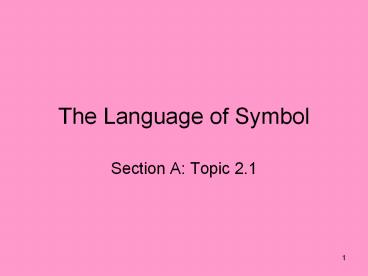Secular symbols: flag, rose, ring, war memorial, tattoos PowerPoint PPT Presentation
1 / 9
Title: Secular symbols: flag, rose, ring, war memorial, tattoos
1
The Language of Symbol
- Section A Topic 2.1
2
Secular symbols flag, rose, ring, war memorial,
tattoos, jewellery, logos / labels
etc. Religious symbols Cross, crescent,
menorah, prayer beads, mandala, incense, water
etc. Symbols are both ancient
contemporary. Why do human beings use symbols?
(Individuals, groups, societies)
3
(No Transcript)
4
(No Transcript)
5
(No Transcript)
6
- Forms of symbolic language
- Importance of symbol in the formulation of
responses to the question of the meaning of life - The power of symbolic language its impact on
individuals, groups societies - Link this theme to G Worship, Prayer and Ritual
- Could look at contemporary symbols and then
historical symbols. - Why use symbols? To communicate meaning
- To unite / create belonging / mark
separation / transition - Examples Orange march on the Garvaghy Road
symbolism has power to unite and divide at the
same time. - Sacred (otherness) and the profane are linked to
symbol.
7
Love, birth, death, happiness, suffering
everything relating to the great questions of
life involving meaning, is difficult to express.
Humans need symbolic language to engage in
express this search. Symbols name participate
in the otherness / abstract / sacred. Symbols can
be objects, gestures / actions, words, music
colour etc examples (Liturgical colours
etc) Symbols move us as they work at a deep
instinctual level. Examples 9/11 symbols. Ritual
repeated, commonly recognised behaviour
through which a community engages with the
mysteries of life (Mc Carthy Dinneen Goggin).
Symbols are vital at a time of death or tragedy.
Symbols help us express grief and
solidarity.
8
Religious symbols when something is given
meaning and considered sacred it is a religious
symbol. Examples words, gestures, colours,
objects, music.
9
Ernst Cassirer (German philosopher) said that
humans are symbolic animals. Humans not only
live life but must give expression to it in
symbols. We are quintessentially the creators of
symbols (Cassidy, p121). Symbols are in
many ways the building blocks of a world of
meaning that encompasses science, religion and
art.

